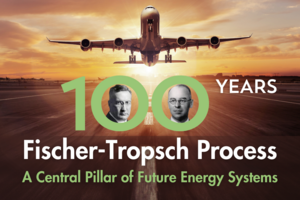From May 5 to 7, 2025, the city of Mülheim an der Ruhr will become a hub of international scientific exchange. An international conference held at the Stadthalle will mark the 100th anniversary of the Fischer-Tropsch synthesis – a chemical process discovered at the former Kaiser Wilhelm Institute for Coal Research (today the Max Planck Institute) that remains highly relevant in the age of sustainable energy.
Originally developed by Franz Fischer and Hans Tropsch, the process converts a mixture of carbon monoxide and hydrogen into liquid hydrocarbons – synthetic fuels and chemical feedstocks. While it once relied on coal and natural gas, today the process can use carbon dioxide captured from the atmosphere and hydrogen produced from renewable electricity, opening new pathways for climate-friendly fuels in sectors like aviation and shipping.
The Mülheim conference will bring together around 200 experts from academia, industry, and policy. In lectures, poster sessions, and panel discussions, they will explore both fundamental research and practical applications. A high-level opening panel will also discuss the broader social and environmental potential of this key technology.
“The Fischer-Tropsch process is more relevant today than ever before,” says Walter Leitner, Director at the Max Planck Institute for Chemical Energy Conversion. “It offers a powerful route for converting carbon-based resources from sustainable sources into usable energy carriers.” Ferdi Schüth, Director at the Max Planck Institute for Coal Research, adds: “This is a prime example of how basic science can pave the way for practical solutions to global challenges.”
Further information can be found in the press release from the MPI für Kohlenforschung.

